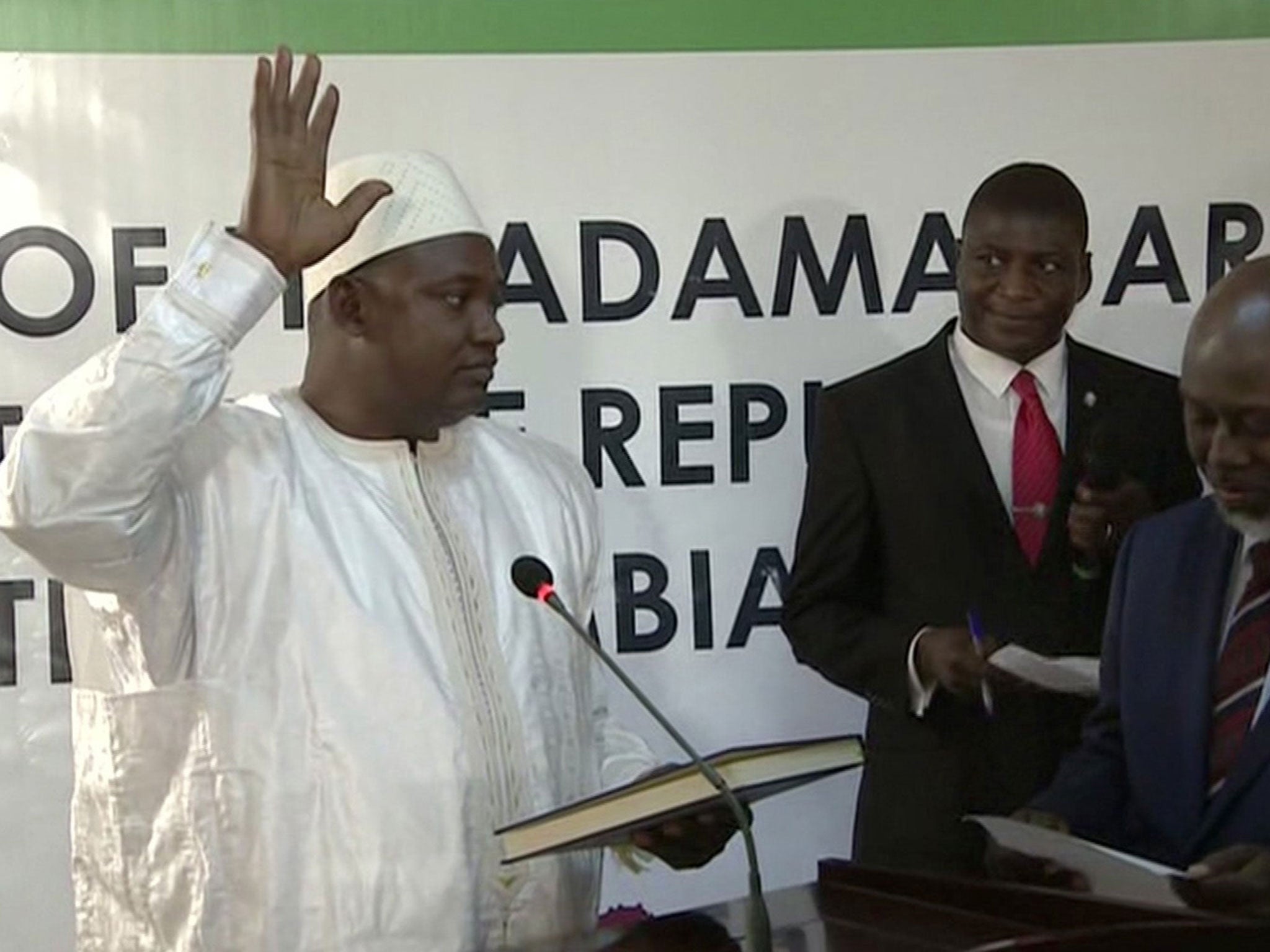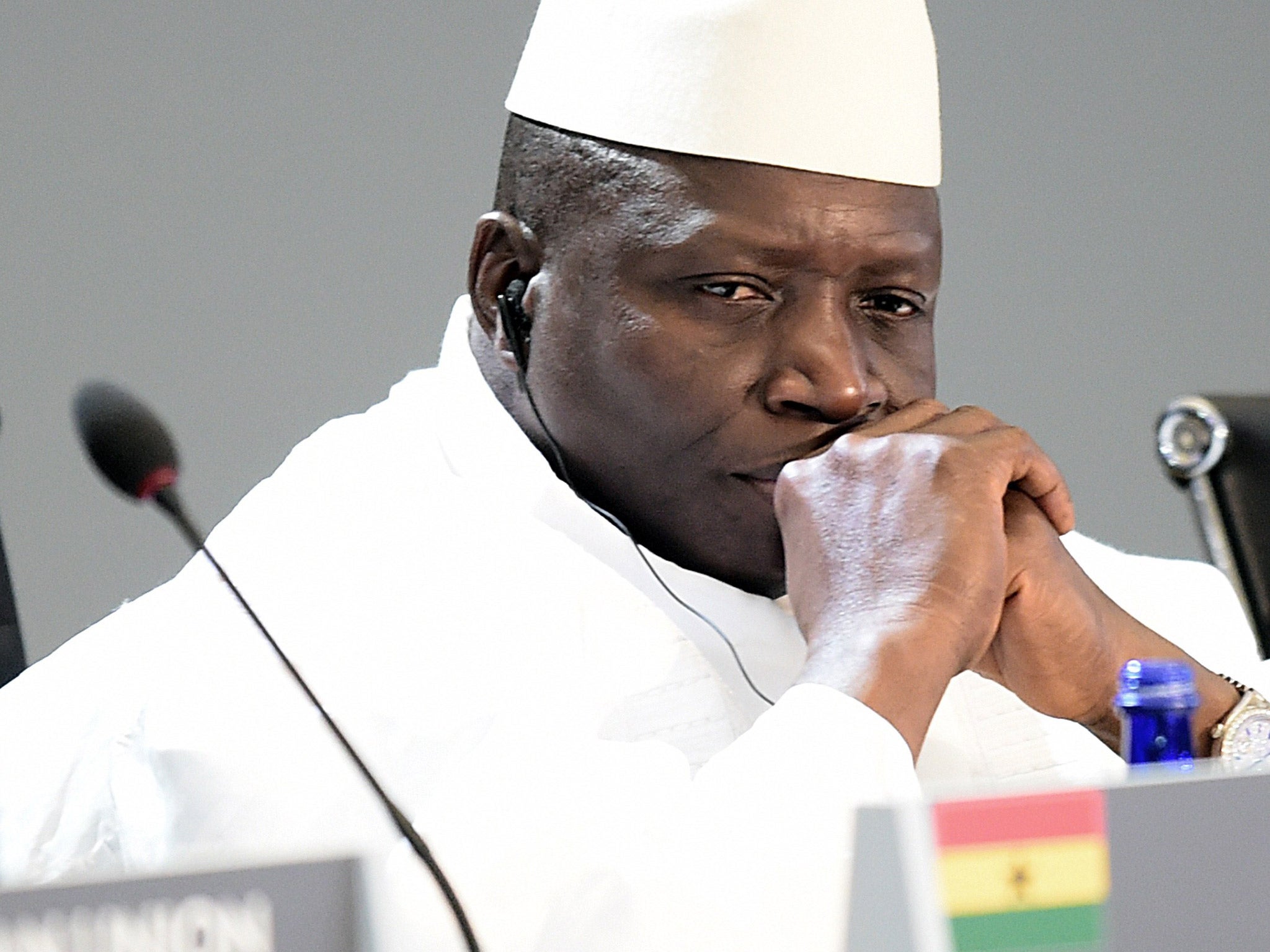Senegal troops enter The Gambia as election victor Adama Barrow is declared President in exile
As things stand, The Gambia has two serving Presidents, with incumbent Yahya Jammeh refusing to give up power

Your support helps us to tell the story
From reproductive rights to climate change to Big Tech, The Independent is on the ground when the story is developing. Whether it's investigating the financials of Elon Musk's pro-Trump PAC or producing our latest documentary, 'The A Word', which shines a light on the American women fighting for reproductive rights, we know how important it is to parse out the facts from the messaging.
At such a critical moment in US history, we need reporters on the ground. Your donation allows us to keep sending journalists to speak to both sides of the story.
The Independent is trusted by Americans across the entire political spectrum. And unlike many other quality news outlets, we choose not to lock Americans out of our reporting and analysis with paywalls. We believe quality journalism should be available to everyone, paid for by those who can afford it.
Your support makes all the difference.Senegalese troops have entered The Gambia, an army spokesman said, moments after the UN Security Council voted unanimously to back the right of election winner Adama Barrow to take power.
Mr Barrow was sworn in as President in exile on Thursday afternoon, in the country’s embassy in neighbouring Senegal, while incumbent Yahya Jammeh continues to cling on to power.
The Security Council resolution invited the formidable west African regional bloc to ensure Mr Barrow’s election victory was respected, but a last-minute amendment urged the use of “political means first”.
Yet minutes after the resolution had passed, Senegalese Colonel Abdou Ndiaye issued a brief statement to news agencies declaring: “We have entered Gambia.”
A delegation of West African leaders – including the the presidents of Liberia, Mauritania and Guinea – are due to arrive in Gambia on Friday as part of a mediation mission, Gambian state television announced.
Mr Barrow’s inauguration ceremony was held in a small conference room at the Dakar embassy, and attended by dignitaries including the President of the Commission from the Economic Community of West African States (Ecowas).
The bloc had threatened to invade The Gambia and forcefully eject Mr Jammeh if he did not step aside peacefully, giving a deadline of midnight on Wednesday. Nigerian gunboats and Senegalese troops assembled on the Gambian border.
Introducing the new President Barrow on Thursday afternoon, an official declared that “after 22 years of a gruelling dictatorship, the Gambian people have opted for change”.
Mr Barrow addressed the audience of delegates, saying: “This is victory of the Gambian nation. Our national flag will now fly high among the other democratic nations of the world.
"This is a day no Gambian will ever forget.
The hastily-arranged ceremony was also an opportunity for the international community to express support for Mr Barrow, their chosen candidate. An Ecowas official said: “The Ecowas Commission, African Union and United Nations congratulate his excellency Adama Barrow, President of the republic of The Gambia, as he is sworn in following his victory at the presidential election on 1 December 2016.
“The Ecowas Commision, AU and UN equally congratulate the people of The Gambia who have demonstrated patience, discipline, maturity and resolve to express their popular will at the election and during the post-election crisis.”

Mr Barrow convincingly won the December election, appearing to bring an end to the more than two decades-long rule of Mr Jammeh, who came to power in a coup in 1994.
Mr Jammeh initially conceded defeat, sparking celebrations across west Africa. But he then changed his mind and said he would not accept the results, saying the election was marred by irregularities.
Botswana announced it no longer recognised Mr Jammeh as The Gambia’s President. It said his refusal to give up power “undermines the ongoing efforts to consolidate democracy and good governance” in The Gambia and in Africa in general.
The streets of Banjul, the Gambian capital, were quiet on Thursday, according to reporters who remained in the city, with few cars and scattered groups of men gathered on roadsides. Shops were closed and petrol was in short supply.
Most tourists and thousands of Gambians have fled the country, including some former cabinet members who resigned in recent days.
Among them were thousands of British holiday-makers, who described a “chaotic” scramble to get on flights out of Africa upon their arrival back in the UK.
Boris Johnson, the British Foreign Secretary, was among the international voices calling for Mr Jammeh to respect the result of the election.
Mr Johnson said: “It is vital that former president Jammeh now stands aside to allow an orderly transition.”
He praised African organisations which are working to ensure “the democratic wishes of the Gambian people will be respected”, stating that the 1 December elections had been free and fair.
Join our commenting forum
Join thought-provoking conversations, follow other Independent readers and see their replies
Comments